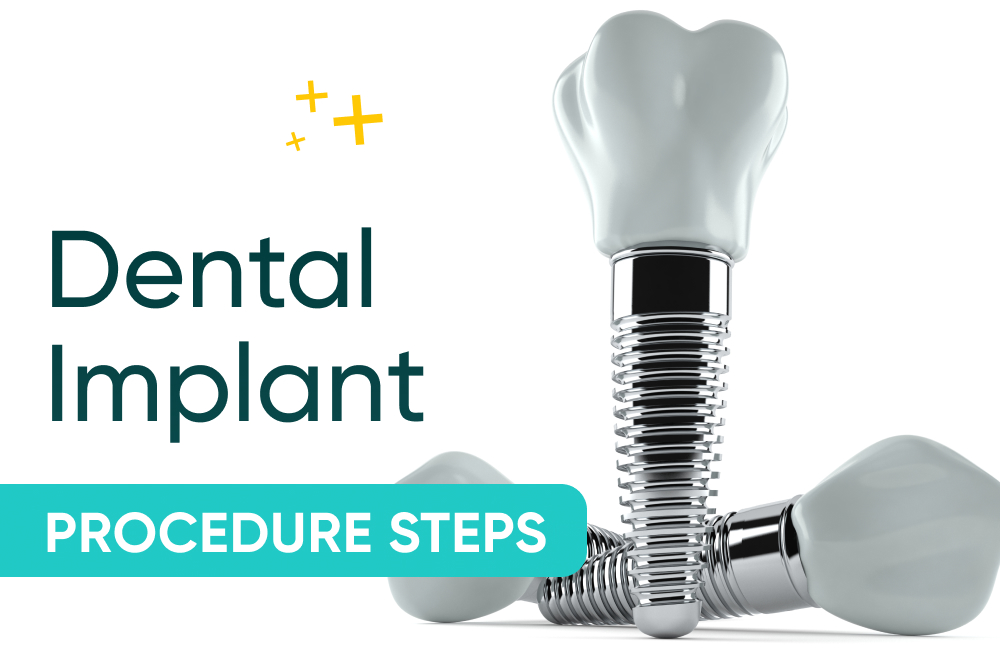Dental implants have been a popular option among the masses. This is for restoring oral function in those who have lost teeth. They provide a lifelike substitute that imitates the appearance and functionality of real teeth.
They also enable patients to restore their self-assurance and enjoy a higher standard of living. If you’re interested in learning more about the tooth implant procedure, read on. In this blog post, we’ll walk you through what to expect when getting dental implants.
Initial Consultation and Assessment
An extensive oral examination is part of the initial consultation. A qualified dental specialist checks the patient’s oral health in different ways. This examination includes a detailed assessment of the entire oral cavity. It also evaluates the visible parts of the mouth to see if there are any difficulties that can sabotage the procedure.
- Discussion and Treatment Options: An important aspect of consultation is communication. This discussion is a two-way exchange, where the patient’s concerns, desires, and expectations are being given due attention. The dental professional provides the solutions to the problem.
- Expectations and Patient Education: Setting realistic expectations is key. Patients are guided through the various stages of the implant process. This transparency ensures that patients understand that there may be possible complications when getting the procedure. So, it allows patients to mentally prepare for each phase.
Treatment Planning
Every individual’s oral health is a distinct landscape. Shaping factors such as bone structure, gum health, remaining teeth, and oral condition.
This is where the beauty of a personalized treatment plan comes into play. Dental professionals tailor the plan to fit each patient.
- Implant Type and Number: The type and number of implants required are important. Some patients may need single implants, while others might enjoy implant-supported bridges. The treatment plan is designed to optimize both functionality and aesthetics. This ensures the patient’s new smile integrates with their natural teeth.
- Bone Grafting and Augmentation: Bone density plays a role in the process of dental implants. The jawbone may lack the necessary density or structure to support implants. So, there is a recommendation for bone grafting or augmentation. Treatment plans should ensure that the jawbone provides a strong and secure foundation.
Dental Implant Placement
The surgical phase of the dental implant process marks a pivotal moment. This phase involves the precise placement of the dental implant.
- Local Anesthesia for Comfort: Your comfort is paramount throughout the entire process. The dental team administers local anesthesia to numb the treatment area. This ensures that you remain comfortable and relaxed.
- Implant Placement: Precision and Expertise: Incisions allow for direct access and this is where the expertise of the dental team comes into play. The implant itself is a remarkable piece of engineering. It may take the form of a screw-shaped or cylindrical structure, crafted from biocompatible materials like titanium.
Osseointegration
The phase of osseointegration marks a remarkable stage in your tooth implant process. The implant fuses with your jawbone, forming a solid and enduring foundation that will support your new screw-in teeth.
- Fusion of Implant and Jawbone: Osseointegration is a biological phenomenon. Your body’s natural bone fuses with the teeth implant’s surface. It is designed to encourage the integration of bone tissue. The bone cells grow and adhere to the implant’s surface. This creates a bond that is as strong and stable as the root of a natural tooth. the implant’s stability within the jawbone increases.
- Temporary Restoration and Healing Cap: Placed over the implant site is temporary restoration. This restoration is often referred to as a healing cap or abutment cover. It protects the implant site from any external forces or debris. This ensures a clean and healing environment. It helps shape the surrounding gum tissue.
Abutment Placement
After processing, your dental implant is ready to enter the next phase. The placement of an abutment marks a crucial step. This bridges the gap between the implant and your final restoration. This ensures both functional stability and aesthetic harmony.
Impression-Taking
The focus is now to capture precise details that will shape the design of your final restoration. Impression-taking involves creating a detailed mold of your abutment and surrounding teeth. This mold serves as the blueprint.
A specialized material is used to create an impression. This involves placing a soft, pliable material over the abutment and surrounding area. The material sets and captures the intricate contours and dimensions of the area.
Final Restoration
The anticipation culminates in the final restoration phase. Placing your custom-made prosthetic tooth. Thus, completing your smile with a harmonious blend of aesthetics and functionality.
- Crafting Your Custom Restoration: The journey to your final restoration begins. Experienced dental professionals make the crown, bridge, or denture. This ensures a flawless integration into your existing smile.
- Secure Attachment to the Abutment: The abutment plays a vital role as it serves as the anchor. The dental professional places the restoration onto the abutment. Ensuring a snug and precise fit.
Post-Procedure Recovery
The post-procedure recovery is a crucial part of the implantation process. This period is essential for ensuring the longevity and success of your new smile. You can promote healing, cut discomfort, and protect your investment in oral health.
- Prioritizing Oral Hygiene: Maintaining impeccable oral hygiene is paramount during the recovery phase. Your implant may integrated with the jawbone. But, the surrounding gum tissue is still healing. Brush your teeth using a soft toothbrush and non-abrasive toothpaste. This ensures that you clean around the abutment and restoration.
- Flossing with Care: Flossing around the implant area requires special attention. Use a soft, unwaxed floss. Ensure that your flossing technique is gentle to avoid disrupting the healing process.
- Rinsing Routines: Recommend a mild saltwater rinse or an antimicrobial mouthwash. Follow their instructions, as proper rinsing can aid in the healing process.
- Dietary Considerations: Your diet also plays a role in your recovery. Opt for soft and chewable foods during the initial days following the procedure. As your healing progresses, introduce firmer foods back into your diet. Avoid hot or cold foods that could cause discomfort around the implant site.
Follow-Up Visits
The journey doesn’t end with a successful restoration. Regular follow-up visits with your dental professional are essential. To ensure the longevity of your implant and the continued health of your smile.
- Monitoring Healing and Integration: Your dental professional will assess the healing progress. These evaluations provide valuable insights into the health.
- Spotting Early Signs of Complications: Regular follow-up appointments help detect complications since issues such as infection, gum inflammation, or implant mobility can arise. To ease your worries, your dental professional can do prompt and effective interventions.
Long-Term Care
Your dental implant becomes a cherished part of your life. A commitment to long-term care and maintenance is essential to ensure its continued success. It’s also less fussy as compared to other dental treatments like root canals.
- Focus On Impeccable Oral Hygiene: Maintaining exceptional oral hygiene habits is important. As with your natural teeth, brushing and flossing are crucial. Brush your teeth at least twice a day. Pay special attention to the abutment and restoration.
- Flossing and Interdental Cleaning: Flossing remains important for dental implants. This helps prevent plaque buildup, gum inflammation, and potential complications.
- Regular Dental Check-Ups: Regular dental check-ups are a non-negotiable aspect of implant care. These appointments allow your dental professional to track the health of your implant. They assess your oral health and provide tailored guidance for maintenance.
Advantages and Considerations
Dental implant surgery offers a transformative solution for restoring smiles and enhancing oral health. They bring forth a multitude of benefits. It’s important to be aware of certain considerations that can influence your decision. Let’s explore both the advantages and considerations of dental implants.
Advantages of Dental Implants
- Improved Oral Function: Dental implants restore the ability to bite, chew, and speak. Their stability and strength mimic that of natural teeth. It enables you to enjoy your favorite foods without hesitation.
- Aesthetic Enhancement: Dental implants provide a seamless aesthetic result. Custom-made restorations blend with your natural teeth. This ensures a smile that looks and feels natural.
- Preservation of Bone: Implants stimulate the jawbone. This prevents bone loss that can occur when teeth are missing. This maintains the facial structure and prevents the sunken appearance.
- Durability and Longevity: With proper care, dental implants can last a lifetime. Implants don’t rely on adjacent teeth for support. This minimizes the impact on neighboring teeth.
- Enhanced Confidence: Dental implants restore self-confidence. By providing a smile that feels secure and looks exceptional. The freedom to engage without worrying about your teeth is invaluable.
Considerations of Dental Implants
- Treatment Duration: Dental implant treatment requires many phases. The process can span several months. This depends on individual factors such as healing ability and treatment complexity.
- Cost: Dental implants represent a significant investment in oral health. Their long-term benefits are large. It’s important to consider the upfront cost. This includes the surgical procedure, restoration, and potential treatments.
- Surgical Procedure: The placement of dental implants involves a surgical procedure. However, advancements in techniques and technology have minimized these concerns.
- Medical Considerations: Certain medical conditions might impact the success of dental implants. Consultation with your healthcare provider is crucial in determining your candidacy.
- Oral Hygiene Commitment: Dental implants need consistent oral hygiene practices and regular visits. Failure to maintain proper oral care can lead to complications.
Get Dental Implants from NoHo Family Dental Today!
Are you ready to regain your smile’s full potential? Look no further than NoHo Family Dental for cutting-edge dental implant solutions that can truly transform your life.
Our dedicated team of experienced professionals understands the importance of a confident smile, and we’re here to guide you through every step of your journey toward dental excellence.
Take the first step towards a brighter future today – schedule your consultation with NoHo Family Dental and discover the life-changing benefits of dental implants. Your confident smile awaits!


